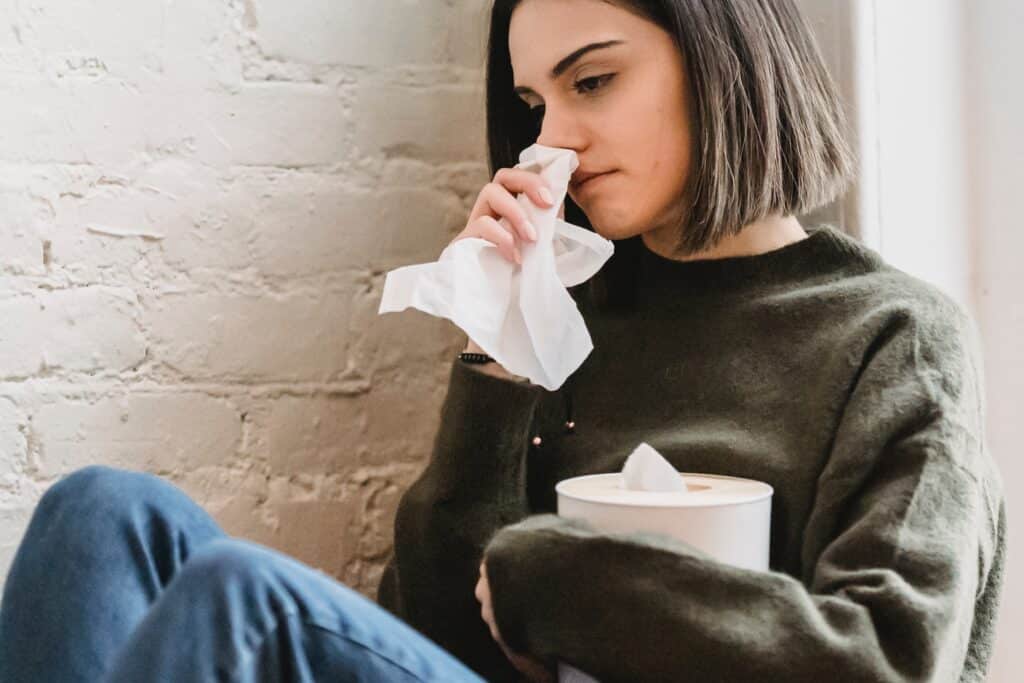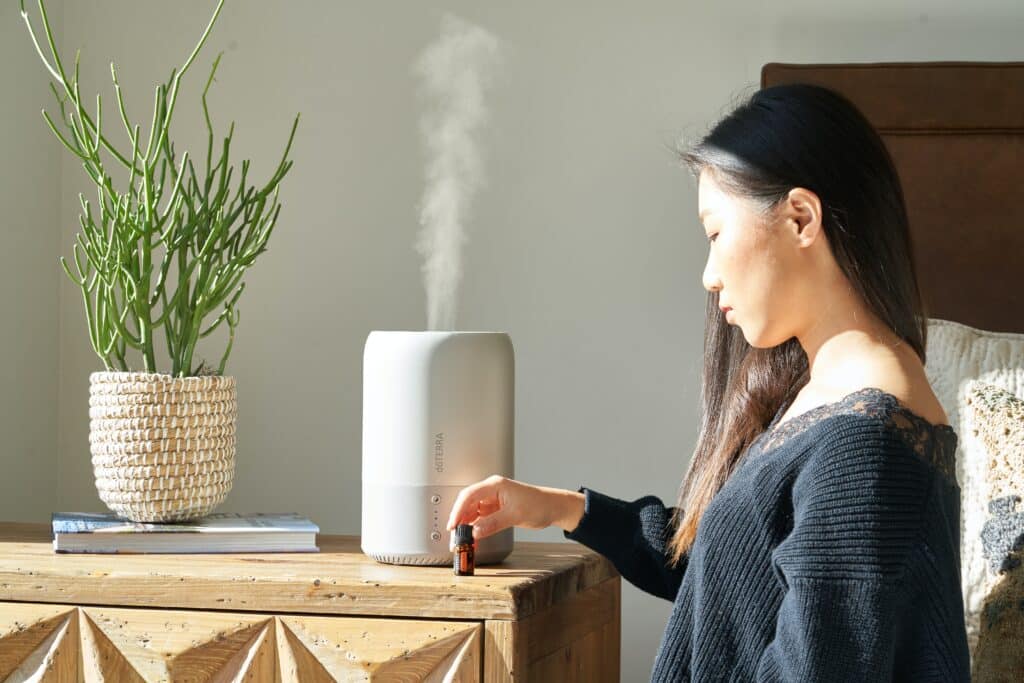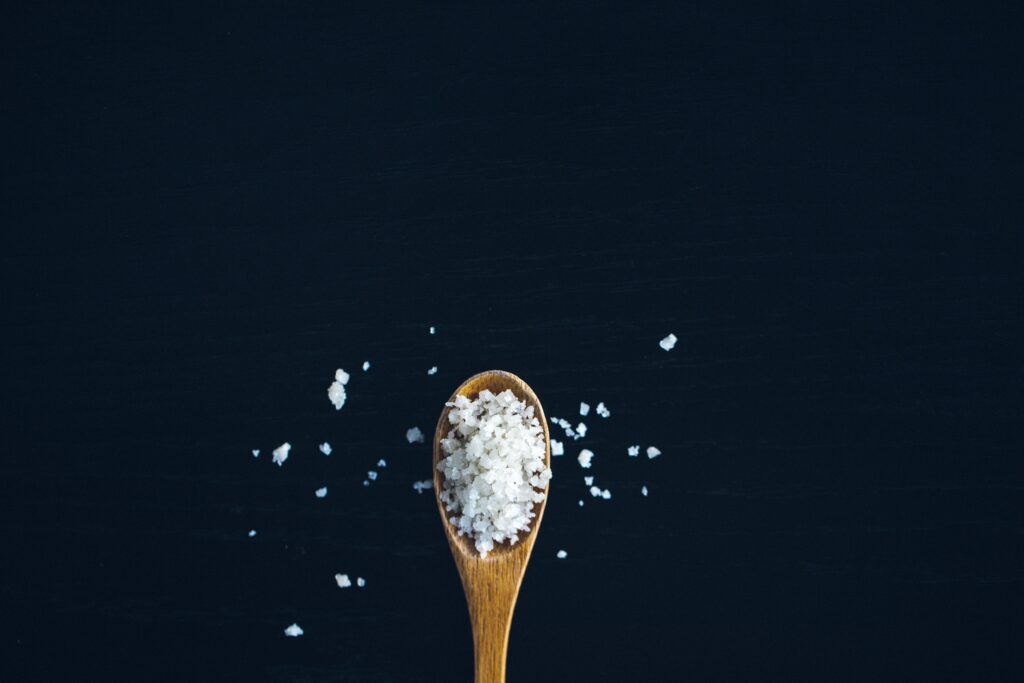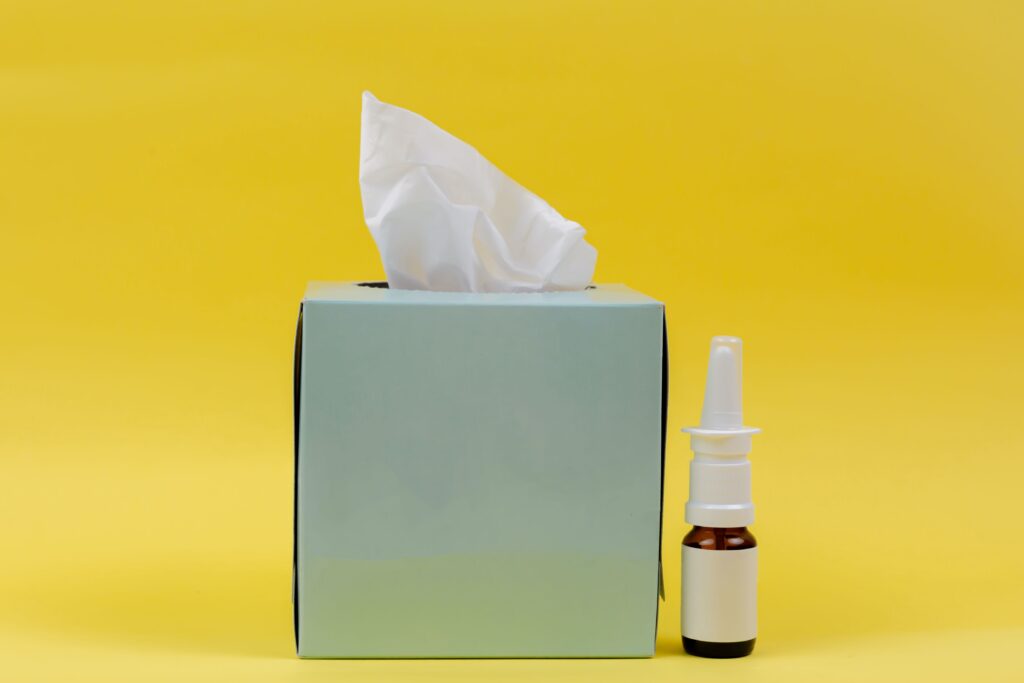Having the sniffles is the worst – so if you’re looking for tips on how to stop nose running, you’ve come to the right place.
A runny nose is basically mucus being discharged out of your nose. Usually, a runny nose can be caused by anything that irritates your nasal passages. If your nose won’t stop running, it may indicate that you have rhinitis. Symptoms include clear, runny discharge caused by swelling or inflammation of your nasal tissues.
A runny nose could also be brought on by cooler temperatures, or by a common cold, flu, or even your allergies. In some cases, you could have a runny nose for an unknown reason – which is called non-allergic rhinitis.
Common Causes Of A Runny Nose
When you get sick, it’s because pathogens or germs have gotten past your mucus lining. This is when your immune system takes over and produces proteins called cytokines – which send out cells to find and destroy harmful pathogens. This causes your nose to produce more mucus to clear your body of any germs.
As your nose produces more mucus, your mucus lining gets swollen and fills your nose with more fluid. Once the germs or pathogens are cleared from your nose, your immune system tells your body that you’re getting better and your mucus lining starts returning to a normal level.

Other causes for a runny nose include:
- Decongestants: While great for helping to dry out your runny nose when you have a cold, prolonged use may actually cause your nose to run or worsens a sore throat.
- Hunger: As you get older, the nerves to your saliva glands may get confused. So instead of an involuntary response like your mouth watering when you see food, your brain may give you a runny nose when eating instead.
- Chronic sinusitis: If you’ve been to the doctor several times with sneezing, a runny nose, and sore throat (among other symptoms), you might have a chronic sinus infection. This could be because you have undiagnosed allergies and there’s an overload of mucus in your nasal passages. If you keep getting sinus infections, you should consider seeing a medical professional to get allergy tests conducted.
- Alcohol: Some people are allergic to certain chemicals or ingredients in wine or beer. The reasons are unclear, but it could be caused by an allergic reaction that causes congestion.
- Dust: If you’re experiencing symptoms like sneezing, a runny nose, or even a cough. It could be caused by too much dust in your environment. Other symptoms like needing to blow your nose first thing in the morning, might be because you’re breathing in dust particles while sleeping. This is more common in the wintertime when the heat in many homes is turned on most of the time.
Other causes of a runny nose include:
- Drug addiction
- Churg-Strauss syndrome
- Hormonal changes
- Wegener’s
- Deviated septum
- Pregnancy
- Nasal polyps
- Dry air
- Asthma
- Respiratory syncytial virus (RSV)
How To Stop Nose Running: 8 At-Home Remedies That Work
A runny nose isn’t something to be too alarmed about. And if you aren’t experiencing any other symptoms, there are some things you can do to manage a runny nose at home.
1. Make sure you’re getting enough fluids.
Staying adequately hydrated when you’re dealing with a runny nose can help – especially if you’re also experiencing symptoms of nasal congestion. This helps mucus to thin out to a runny consistency and makes it easier for you to blow your nose and expel it. Otherwise, your nose can easily become congested.
Of course, this also means while you’re on your “how to stop a running nose” journey, that you should avoid drinking anything that can dehydrate you, like coffee and alcohol.

How to stop nose running? Tea!
If you’re already a believer in tea’s curing properties, then you know that certain herbal teas contain mild decongestants. Some teas that contain anti-inflammatory and antihistamine herbs include chamomile, ginger, mint, or nettle.
Plus, while you’re staying hydrated, hot beverages like tea are often more helpful than cold ones. This is because of their heat and steam – which also help to open and decongest airways.
So, make a cup of steaming herbal tea (preferably non-caffeinated) and inhale the steam before drinking. Sore throats often accompany runny noses – drinking hot herbal tea can also help soothe a sore throat.
3. And so is humidifying.
Going hand-in-hand with your tea-drinking remedy, a 2019 study proved that inhaling warm steam helps to significantly improve mucus build-up caused by allergic rhinitis. Additionally, a 2015 study of people with the common cold found that using steam inhalation was effective, and reduced recovery time by about 1 week compared to no steam inhalation at all.
Humidifiers work by transforming water into vapor to moisten otherwise dry air. When you inhale moist air, it helps to thin and dislodge mucus and soothe irritated sinuses.
Remember that if you do use a humidifier, you should clean it regularly, according to the instructions. Otherwise, it could become a breeding ground for bacteria – ultimately worsening sinus conditions.
If you need some quick relief and don’t have a humidifier, take a hot shower.
The hot vapors help to ease a runny and stuffy nose.

4. Facial steam.
Want a facial and a quick tip on how to stop nose running? Try a facial steam.
Similarly, to a cup of hot tea and the humidifier, a facial steam can loosen mucus and alleviate a runny nose.
Here’s how you can do it:
- Heat water in a clean pot on your stove enough so that steam starts forming – but don’t let it reach boiling point.
- Place your face about 8-12 inches above the steam for about 5 minutes at a time. Don’t let your face touch the water. Close your eyes and breathe in deeply through your nose. If your face gets too hot, take a break.
- Blow your nose afterward to get rid of mucus.
- Repeat 2-3 times a day if you still have symptoms.
To ramp up the decongestant properties, add some drops of essential oil. Eucalyptus, peppermint, pine, sage, rosemary, spearmint, tea tree, and thyme are great options.
Compounds like menthol and thymol found in these plants are also found in many over-the-counter (OTC) decongestants.
And if you don’t have essential oils, you can use dried versions of these herbs.
5. Salt water.
This one may be unpleasant, but it’s an excellent natural remedy for clearing up a runny nose.
Salt water has antibacterial properties which can be helpful – particularly during allergy season.
Start by mixing one-half teaspoon of table salt with two cups of warm water. Then use a dropper to place a few drops of solution into each nostril. (If you don’t have a dropper, just use a glass, and lean over the sink with your head at an angle, to allow some salt water to enter your nose).
Gently inhale to bring the solution further into your nostrils, and blow your nose afterward to clean out any excess mucus or fluids.

You can also use a neti pot for nasal irrigation (or nasal lavage) to clear up your running nose.
Neti pots are small teapot-like containers with a spout. To use one, make a warm saline or saltwater solution, and then pour the solution through one nostril and out the other. This effectively rinses your nasal passages out.
You can find neti pots at pharmacies, stores, and online. Make sure you follow the directions and use sterile water instead of tap water, and you’re all set.
7. Eat spicy foods.
If you love spicy foods then your runny nose is a great excuse to load up on some spicy dishes, especially if you’re also experiencing nasal congestion. In addition to creating a feeling of heat when eaten, spices dilate passageways in the body and help relieve sinus issues.
Hot spices like cayenne pepper, habanero, wasabi, horseradish, turmeric, and ginger are great options.
Several studies on capsaicin – the chemical that makes chili peppers spicy – have found that it is more effective at treating runny noses than the OTC medication budesonide.
In addition, both ginger and turmeric have anti-inflammatory and bacteria-fighting properties.

Applying a warm compress or washcloth to your forehead and nose a few times a day may help to improve your runny nose and soothe the pressure that often comes with sinus problems.
It works by boosting blood circulation in your sinus area, helping break up nasal stuffiness by adding moisture to the air you breathe.
Make one at home by soaking a clean cloth in hot (not boiling) tap water and place it across your forehead and nose for 15-20 minutes. Reapplying as needed.
Over The Counter Treatments For How To Stop Running Noses
If your runny nose just doesn’t seem to go away, and your mucus appears clear and thin, your running nose could be allergy related.

When Should I Contact a Healthcare Provider to Treat a Runny Nose?
If your symptoms last for more than 10 days, you should consult with a doctor about other treatment options. And if you’re experiencing any of the following symptoms, you may have a sinus infection and might require antibiotics:
- Green or yellow mucus
- Blood in nasal discharge
If you think your runny nose is the result of an infection, seasonal allergies, or won’t go away, book an appointment (telemedicine or in-person) with one of Air Doctor’s professional doctors from anywhere in the world.











